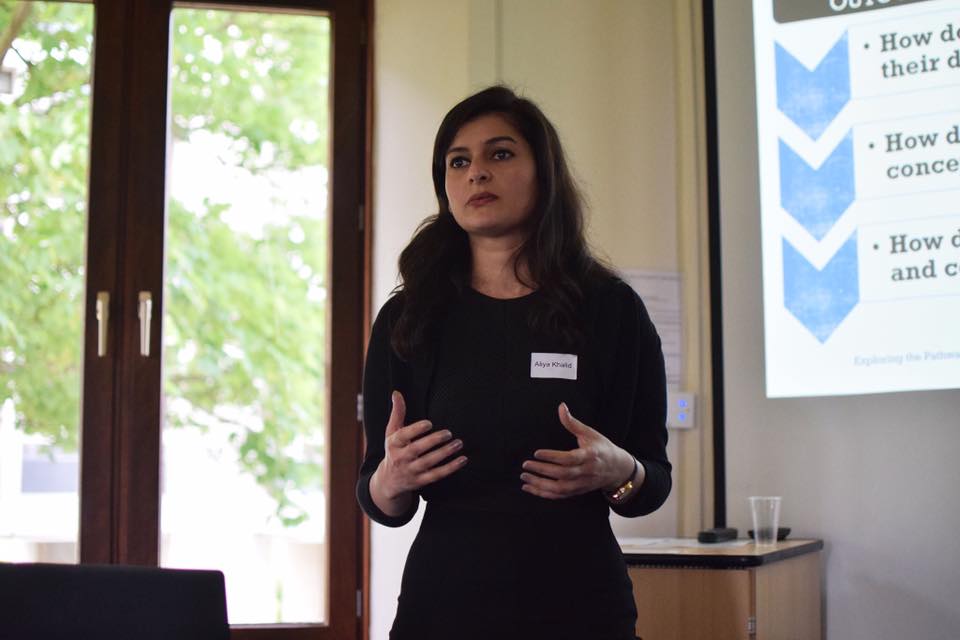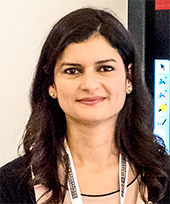
Aliya Khalid's research investigates the role mothers play in their daughters education in Punjab, Pakistan.
If you invest in empowering mothers you are also supporting their daughters. But it is not enough to give women money. They need to feel some sense of agency, an agency they will transfer to their daughters.
Aliya Khalid
Aliya Khalid [2015] was born in Peshawar in North West Pakistan, a region which borders Afghanistan and which has suffered many suicide bombings and terrorist attacks. Although she doesn’t come from the tribal areas along the border, Aliya says the general mindset in the region has been affected by the presence of the Taliban and groups sympathetic to them. That includes the treatment of women.
She has seen how strong and resilient women in this region are. “If you invest in these women you are investing in something very sustainable,” she says. “If you invest in empowering them you are also supporting their daughters. But resources are limited so policymakers need to be strategic. They need to focus on what works. It is not enough to give women money. They need to feel some sense of agency, an agency they will transfer to their daughters.”
It is what creates that sense of agency which is at the heart of her research into mothers and daughters in Punjab and it is a sense of agency which she herself has struggled with as a result of patriarchal structures, despite being brought up in a non-traditional family which treated her and her four sisters essentially like sons, encouraging them to question the world around them, to speak up and to embrace education.
A love of learning
Her parents, indeed, started a girls school followed by a boys school. Aliya, however, was sent to a Christian girls school which shared a wall with a madrassa. “You could hear the azan [call for prayer] and the church bells from the same place,” she recalls.
Aliya moved from school to college at the age of 15, winning a scholarship to do so, and at 18 she got married. Her sister had married her husband’s brother so she knew the family a little.
It was a difficult and abusive marriage both physically and psychologically. Aliya had always wanted to go to university and loved science, especially Physics. “I love to learn,” she says. “If I am put in a situation where I can’t learn it kills me.” Her husband and his family did not want her to become more educated than the men around her. As a condition of her marriage, however, her parents insisted she continue her studies. Her husband’s family agreed, but when she was married they wouldn’t let her go to university. So Aliya’s mother signed her up for an English literature degree at a private college and brought her books to read. She taught herself and only had to go to college at the end of her course to sit her exams. She passed, but that was the end of her studies as far as her husband’s family were concerned.
She spent the next eight years more or less confined to the home, bringing up her two children. She was not free to keep in touch with her own family and could not go out without permission or a chaperone. “I was going crazy,” she says. “It was like I had disappeared.”
Things were to get worse, though. Her sister was banished from her home in Islamabad and forbidden from seeing her four children. The family began to treat Aliya as if she was invisible. “It was as if I was transparent,” she says. Her husband threatened to take her children away too. In the end, she and her children were rescued by her parents and the police. There then followed extensive litigation over custody, which is still ongoing.
Aliya took a job as a blogger to earn some money, but her father told her she needed to return to her studies. Although she had lost all confidence after so many years out of academic studies, she passed the entrance exam to do a master’s in Public Administration at the Institute of Management Sciences in Peshawar. “I needed time to heal,” she says. “The romantic notion of education was a saviour to me.” During her eight years at home she had read Stephen Hawking’s book A Brief History of Time. “It kept me going,” she says. “I understood the physics and that showed me that my brain was not dead.” She has recently met Professor Hawking in Cambridge and told him how important his book had been to her.
Aliya says that more than just education, the master’s gave her the feeling that she could do anything she wanted to. Having been silenced for so long, she seized every opportunity to ask questions – and still does. “I always ask questions,” she says. “I am determined to speak”. At university she also became involved in a youth empowerment organisation and on one occasion helped women prisoners build a play area for their children, campaigned to raise funds for a student who was in danger of dropping out and was eager to help colleagues when she could.
Women's resilience
Aliya finished her master’s in 2012 and was awarded a gold medal. She then worked for a year and a half on a project on skills training for conflict victims where she was the only woman in the department. She says it was a male run setup. “I had to establish my name and I knew that diligence and hard work would do the trick. I knew my dedication would show and it did. I became an indispensable member of the team by the time I left. The only person you should compare yourself against is yourself in the past,” she says.
The conflict victims she worked with made a big impression on her, for instance, a woman who had lost both her sons in conflict. “I could see the misery in her eyes, but she was continuing. Many women like her had no education, but they were as smart, if not more as any other person who had received education. The skill you need in such circumstances is resilience more than your ABCs,” says Aliya. “It made me think a lot about resilience issues.”
She left the project when her mother became unwell and she and her sister took over the running of their schools. Aliya ran the boys’ school and her sister the girls’ school. It reinforced for her how valued and respected education was in her country.
Aliya was keen to continue her academic studies and wanted her children to have the experience of living abroad so she looked at possibilities in the UK, having visited her sister there when she was studying in Lancaster. She applied only to the University of Cambridge and says she wouldn’t have been able to take up the course without both the Gates Cambridge scholarship and her family’s support, especially her mother’s.
Aliya applied for an MPhil in Public Policy initially, but couldn’t get visas for her children because the course was too short. She had been interested in doing a PhD and knew of the work being done in India and Pakistan in the Research for Equitable Access and Learning centre in Cambridge. With the support of Gates Cambridge, she was able to switch to a PhD in Education and is now a member of the research centre.
It will focus on what affects women’s sense of agency and how this impacts their decisions on whether to educate their daughters. She has adopted a two-pronged theoretical approach which encompasses not only the mother’s education, but the influence of other family members, the local community and broader society. Using the capability approach she is focusing on women’s opportunities to be autonomous and the impact of this on their daughters. She has combined this with cooperative conflict theory which covers mindset and social setting, including a woman’s sense of her own value. She says the two theories have not been brought together before to explain maternal influence as a process. She is seeking to create an evaluative protocol which helps define what the dominant issues are for women in certain populations. She hopes it will help policymakers know where to direct resources to get the best outcomes.
Aliya, who is based at Newnham College, has already done a pilot for her field work with families in the UK and Pakistan. She believes that legislation is one issue that can make a difference by providing protection, but that different strategies are needed for different contexts. “You need to know what is wrong if you want to empower women,” she says. “Policies need to be tailored to women’s individual circumstances,” says Aliya.
As both a mother and a daughter, she is very aware of the strong influence of mothers on their daughters’ education choices and is clear that understanding what limits mothers is a vital part of the jigsaw. “Mothers are so important and you can also reach men when you talk about their mothers’ influence,” she says. “When I think back the strongest influence on me has been my mother. For me a mother is more than someone who gives birth. It is a feeling that there is someone who puts you before themselves. In that sense my elder sister and the rest of my family have mothered (nurtured) me to be where I am now. When I was struggling with my marriage, I would often close my eyes and my mother would be there.”

Aliya Khalid
- Alumni
- Pakistan
- 2015 PhD Education
- Newnham College
I am a Teaching and Research Associate at the Faculty of Education, University of Cambridge. Through my teaching role, I am pursuing work on epistemic justice and the promotion of Southern knowledges (plural) and epistemologies. In this regard, I have co-initiated an international seminar series entitled: 'The politics of knowledge building in education and international development', at the Faculty of Education through which I aim to generate conversations around the politics and hegemonies of global knowledge production in my field.
I completed my Ph.D. on gender, education, and development from the Faculty of Education, the University of Cambridge in 2020. My Ph.D. research focused on women's agency in highly constrained circumstances. I have drawn extensively on the Human Development and Capability Approach in this work.
More recently, my research has focused on social justice and equity in education within the UK context. Acknowledging that children from ethnic minority backgrounds are worst affected by Covid-19, I am engaged in research on the learning experiences of children from ethnic minority families in England. In this regard, I am involved in a project funded through the Cambridge Humanities Research Grants Scheme on the learning experiences of secondary school children from ethnic minority families in England during Covid-19.
I am also a lead researcher with colleagues from the universities of Durham and Newcastle on a British Academy-funded project, 'Bridging the Local and Global: Women’s Spaces and Collectives' with women from ethnic minority families in the UK. This project aims to understand how women from ethnic minority families in England create collective spaces for action and reflection, for themselves and their families. Through this research, we seek to argue that any global understanding of women's efforts needs to seek knowledge from women themselves in their local contexts.
Previous Education
Institute of Management Sciences Peshawar
University of Peshawar
Links
https://www.educ.cam.ac.uk/people/staff/khalid
https://www.linkedin.com/in/aliya-khalid-b2b19463












